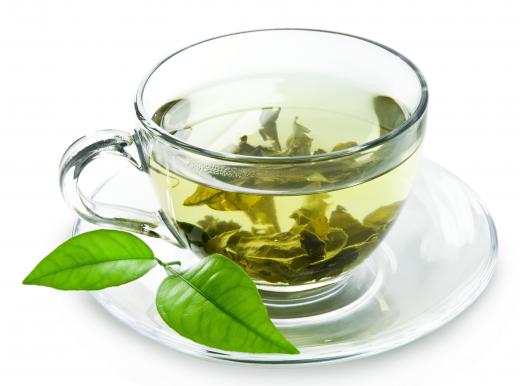What is Glycation?
 Karyn Maier
Karyn Maier
Glycation is a reaction that takes place when simple sugar molecules, such as fructose or glucose, become attached to proteins or lipid fats without the moderation of an enzyme. This results in the formation of rogue molecules known as advanced glycation endproducts (AGEs). This process, also known as non-enzymatic glycosylation, is normally governed by enzymatic activity, which is necessary to regulate the metabolic functioning of molecules. The lack of this catalyst deters the normal glycosylation of sugars to produced needed energy, however, and since it disrupts normal metabolic pathways and advances the circulation of AGEs, it can promote certain health risks.
Exogenous glycations, one form that occurs outside the body, are responsible for allowing foods to brown during cooking. This type is dubbed the Maillard reaction, in honor of the early 20th century French chemist who first observed how sugars react with fats or proteins while exposed to high temperatures. While crisp French fries and grilled meats may be tasty, the reaction that produces them also creates 2-propenamide, a suspected carcinogen that comes with the meal. In addition, exogenous AGEs are sometimes added to certain foods to enhance color and flavor, including baked goods, dark colas, and coffee.

Endogenous glycation, which occurs in the body, is associated with increased oxidative damage. AGEs and their by-products are linked to many age-related diseases, including Alzheimer’s. This process is of particular concern for diabetics, who already suffer from the effects of poor glucose control. In fact, elevated levels of AGEs contribute to a number of diabetes-related complications, including neuropathy, retinal disease, and kidney failure.

Elevated levels of AGEs also deplete nitric oxide levels, which promotes vascular damage and an increased risk for heart disease. As sugar molecules bind to high-density lipoprotein molecules — the “good” cholesterol — the latter are blocked from binding to receptor sites in the liver. The end result is that the liver is duped into thinking there’s a shortage of cholesterol and keeps manufacturing more to deposit into the bloodstream.

AGEs seem to age the human body faster than nature intended. In addition to limiting consumption of baked goods, fried foods, and other high content AGE-containing foods, studies have shown that certain nutrients may serve as inhibitors of this process. For instance, calcium pyruvate and carnosine not only appear to help prevent the reaction, but also stimulate proteolysis, or the degradation of glycated proteins. Certain plant extracts have also been studied for their potential to prevent glycation, at least in vitro. Among those that have shown promising results are cinnamon, black pepper, ginger, cumin, and green tea.
AS FEATURED ON:
AS FEATURED ON:













Discussion Comments
Just minimize carbohydrates, preferably replacing them with mono and saturated fats, and certainly avoiding industrially processed fats.
Next week, meat doused in sugar brine and grilled will cure Alzheimer's.
In response to the comments about the sugars: processed sugars are much different than naturally occurring sugars. For instance, the pectin in fruit binds with the fructose to keep it from causing some of its negative effects. Once example I can think of is the formation of methanol in the body. Processed fructose and fruit juices produce methanol in the body, while fruit with the naturally occurring pectin in it, does not allow this reaction. It may be a similar reason why eating raw fruit does not cause glycation like fructose, high fructose corn sugar and other processed sugars. Don't eat too much fruit, but don't eliminate it from your diet.
Is it possible to break this down into plain English?
As opposed to eating only raw foods or foods processed in a dehydrator at temps below 115 fahrenheit --see post number 6, could one not cook foods without sugars? Would that prevent exogenous glycation?
It is my understanding that:
Exogenous glycation occurs when you cook sugars with fats/proteins resulting in a maillard reaction that may lead to foods containing carcinogens (2-propenade).
My question: Could you avoid exogenous glycation by avoiding the use of sugars when cooking?
I do not fully understand what occurs in endogenous glycation. I assume sugars still bind haphazardly to proteins/fats within the body leading to rogue proteins (AGEs). Glycation occurs due to non-enzymatic glycosylation, but why? Are we lacking enzymes when this happens? Why? Does glycation occur because we mix food types? Should we consider not eating sugars at the same time as proteins of fats?
Are there certain sugars that are more likely to cause glycation (e.g. fructose?) if so why? - can any kind expert explain the process to me? All replies much appreciated.
Is glycation more of a risk with glucose,fructose or lactose? Or is there no difference? Am I right in thinking that there is up to ten times more risk of glycation occurring (i.e. sugar molecules binding haphazardly to protein molecules and ? denaturing them) with fructose than with glucose or lactose? Can any one explain why/why not? Replies much appreciated.
I wouldn't cut the fruit out of your diet.
I would consider transitioning to a "raw" die -- no cooking in this diet and most of the time it winds up being a vegan diet, unless you choose to consume raw dairy products.
A dehydrator becomes your new "oven." Food/meal preparations (including cookies, cracker among other goodies) are dehydrated or warmed using low temps (between 95 and no higher than 115 F usually).
It is a lifestyle change so you really need to be determined that this is important enough to make it your new way of nourishing and taking care of your body.
Fruit? Where does it say anything in this article about fruit? It's talking about baked goods and cooked meat and their browning(Maillard reaction).
Hi I am keen to know what the risks of glycation are and if I should consider cutting fruit out of my diet completely to reduce the risk. Are there any experts out there who could advise. Replies much appreciated.
I recently attended a lecture given by a skin care product manufacturer. They are way ahead of the glycation game as far as skin care and aging are concerned. Their products are formulated with ingredients to reduce the damage of glycation of the skin. This is a fascinating subject and I have not heard of this in the field of skin care prior. I am a licensed ethetician (skin care therapist) and naturally I am concerned about the aging of my skin and the skin of my clients.
Post your comments